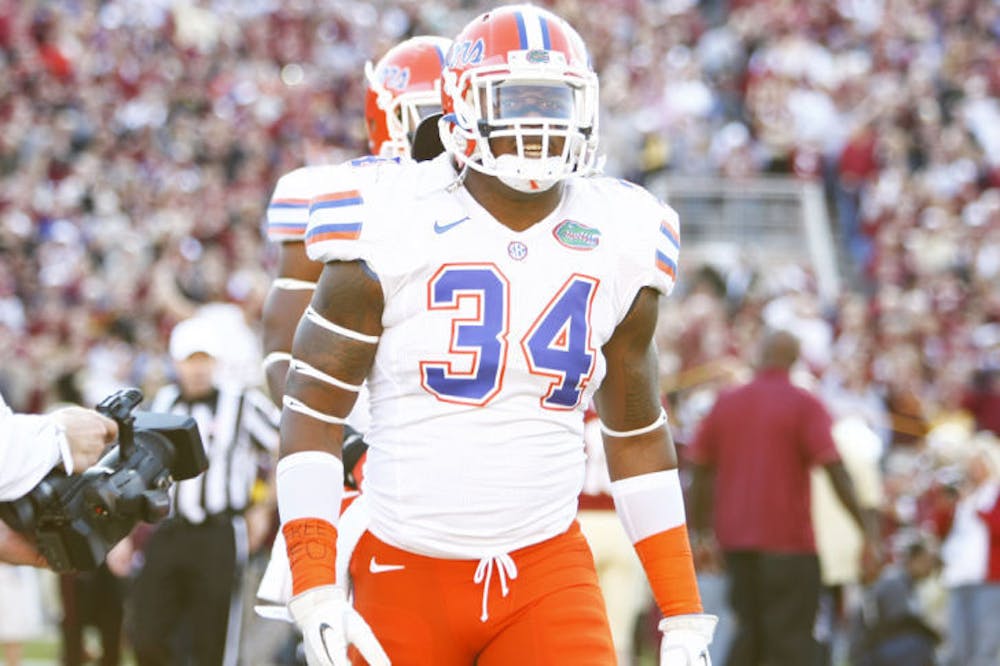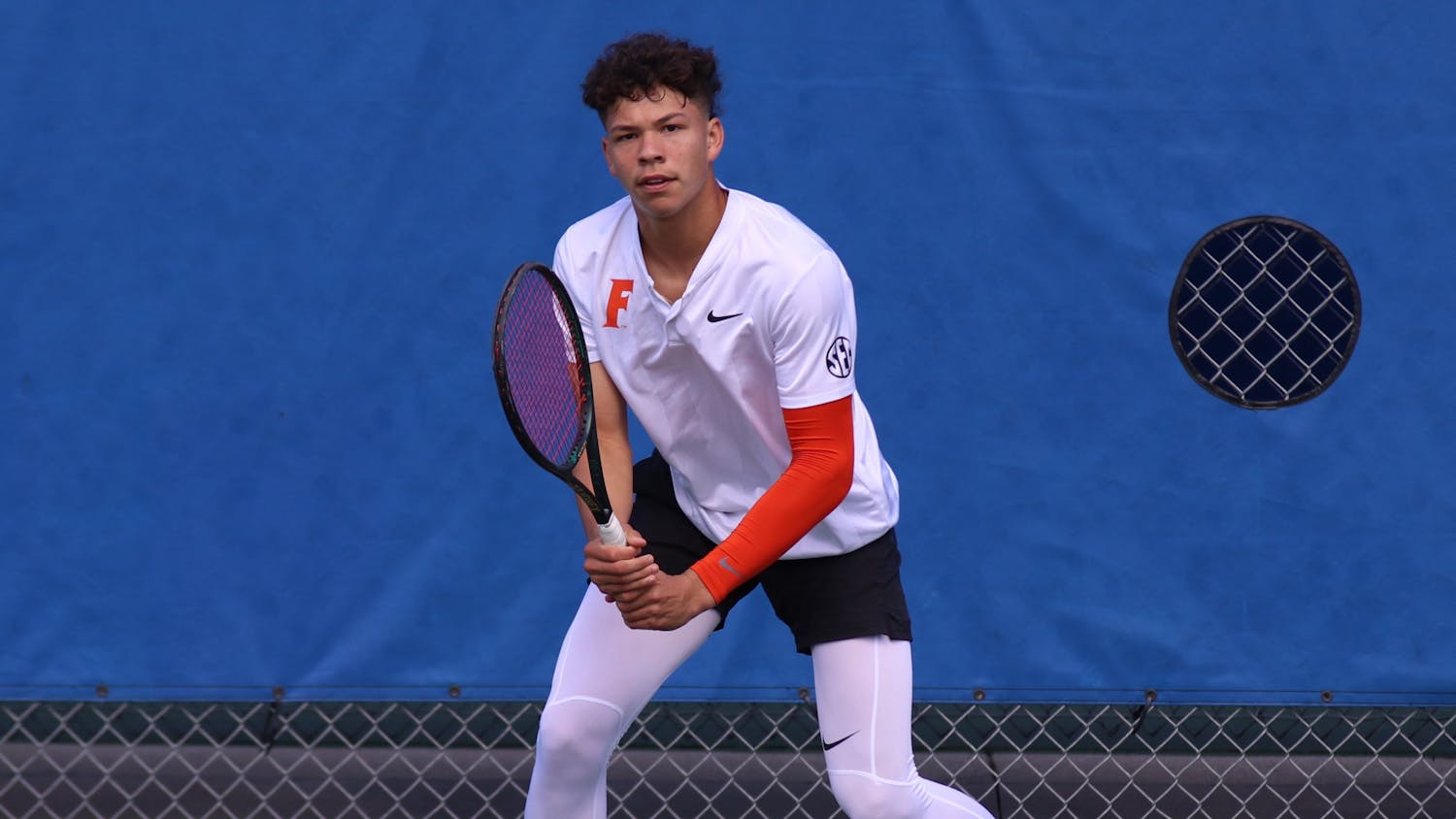When they arrived at Union Correctional Institution after an 85-mile drive from their home in Ocala, Lerentee McCray and his mother, Sybil, were met by a gaunt figure.
Lerentee remembered his older brother as a 5-foot-11, 195-pound athletic freak. The Florida Department of Corrections now lists Leonardo Simpkins at just 143 pounds, a dramatic weight loss brought on by a fear that the guards are trying to poison him.
Lerentee said he brought Simpkins more than $150 worth of food. As the family spoke through the glass and bars that divided them, Lerentee and Sybil watched Simpkins eat in comfort.
That day, Lerentee could only provide groceries. This time next week, he may be able to provide much more, and not just for Simpkins.
The 2013 NFL Draft begins on Thursday, and many projections have Lerentee as a late-round selection. A chance to play in the NFL would mark a new peak in Lerentee’s football career — a journey that has always been geared toward someday providing for his family.
For a father who was deported to Jamaica when Lerentee was in elementary school.
For a single mother who provided for Lerentee and his two brothers.
And for a brother who is in the midst of a 29-year sentence for crimes Lerentee and Sybil believe he didn’t commit.
“I really think he was falsely convicted,” Lerentee said. “When I get money, I’ll be able to get him a lawyer and get him an appeal.”
Simpkins is currently in Close Management I — the strictest classification Florida offers inmates. He earned it as a result of an assault on a staff member. He lives alone in a single cell. The Florida Department of Corrections has labeled him an “extreme security and management risk.”
The family’s first visit in more than a year is the result of a mistake by the Florida Department of Corrections. Under the terms of his sentence, Simpkins isn’t allowed any visitors until Sept. 8. He can be contacted only by phone or by letter.
During the three months following the 2012 Florida football season, Lerentee said he wrote his brother at least 15 times.
The family reunion was a joyful one. For 2 hours, the three exchanged stories and reminisced about old memories — times Lerentee spent working towards a dream that may be realized in just a few short days.
“I’m pretty sure that’s been on his mind since he was a sophomore in high school,” said Frank Beasley, Lerentee’s coach at Ocala Dunnellon High. “There’s no doubt in my mind that this is the culmination of a lot of things for him.”
***
Lerentee’s injury history alone is more adversity than most players face during their college careers.
After enrolling at UF in 2008, Lerentee missed 11 games in 2009 with a hamstring injury. In 2010, he missed three games with an ankle injury. In 2011, he missed four with a pinched nerve. In 2012, he was healthy for just two games before suffering a torn rotator cuff and playing hurt the rest of the season. He also suffered a sprained ankle on Oct. 27.
The rotator cuff required postseason surgery. The procedure forced him to miss the NFL Scouting Combine, the East/West Shrine Game and Florida’s annual Pro Day. His draft stock dipped.
After what Lerentee has been through in his personal life, injuries don’t faze him.
Shortly after 8:30 a.m. on July 21, 2007 — the summer before Lerentee’s senior year of high school — Simpkins was arrested and charged with principal first-degree robbery with a firearm.
Police allege that Simpkins and 16-year-old Chris McCallum stole less than $300 from a Pizza Hut. According to arrest reports and depositions, Simpkins removed manager Stephanie Crouse from her vehicle at gunpoint and forced her to attempt to open the main safe. When Crouse tried to activate the silent alarm, she remembers being jerked around and hit on the back of the head with the butt of the gun.
Although both suspects had their faces covered at the time of the crime, police dogs later found Simpkins hiding shirtless in a bush about a mile from the restaurant. A man living in the area saw a figure run through his back yard around the time Simpkins would have been fleeing. A glove and gun left behind had traces of Simpkins’ DNA, as did a shirt found along Simpkins’ most likely escape route. Upon returning to the crime scene, police found footprints identical to Simpkins’ black, size 11 ½ Air Jordans.
McCallum’s brother, Arellis McFatten, said he dropped Simpkins and McCallum off not far from the Pizza Hut. As a former employee, McFatten said he had given Simpkins information about the layout of the Pizza Hut and the amount of money the business typically brings in. He said the robbery was Simpkins’ idea.
Sybil and Lerentee were in disbelief. In their eyes, Simpkins had always been kind and diligent. He worked at Cracker Barrel, McDonald’s and Sonny’s in high school, training for what he still hopes is a future as a chef. A learning disability made school a challenge, but Simpkins had passed four of the five tests necessary to get his GED.
When speaking to Sybil from prison, Simpkins asks her to look after his grandmother and call other inmates to keep them from feeling lonely.
That he could be guilty of such a crime was, to them, nearly unthinkable.
“Unbelievable,” Sybil said. “I was like, ‘No, that ain’t my child. That ain’t my baby. Y’all are lying.’”
The case went to trial, and Simpkins was sentenced to 20 years in prison.
Sybil and Lerentee aren’t convinced. Lerentee believes Simpkins was only in the wrong place at the wrong time. McCallum said in his deposition that he came up with the plan, that Simpkins was not involved in the crime. He knew Simpkins growing up, and the man assisting in the robbery wasn’t him. It was a person by the name of Cuz, who McCallum had never met previously and had no other way of identifying.
The dog that tracked Simpkins had to be driven to a new location during the search. The defense argued that it could have lost the scent along the way. That Simpkins’ shoe was improperly handled. That in a restaurant with 33 shoe prints, an Air Jordan isn’t a surprising find. That the glove and shirt with DNA matching Simpkins also contained other people’s DNA.
The family couldn’t afford a lawyer, so Simpkins was represented by a public defender.
“I have had lawyers tell me that there are different flaws in the case,” Sybil said.
Simpkins is also serving three years each for fleeing police, possession of cocaine and obstruction of a criminal investigation stemming from a Nov. 3, 2007 incident during which he was also charged with first-degree attempted murder with a firearm.
Around 3 a.m., approximately 16 shots were fired from the driver’s side of a light-colored vehicle into a group of 20 or 30 people in a residential area. Several subjects sustained gunshot wounds and were immediately taken to the hospital. Witnesses believe the shooting was connected to a brawl at an Ocala nightclub about three miles away.
Nearly 3 and a half hours later, deputy Brian Haworth pulled Simpkins over for cutting him off and driving his blue Buick 75 in a 65 mph zone. Upon approaching the vehicle, Haworth noticed a 9 mm semi-automatic handgun. When Haworth retreated and ordered Simpkins to exit the car, Simpkins led Haworth on a chase for about four miles.
The pursuit reached speeds of 90 miles per hour before Simpkins pulled off the highway, crashed into a dump truck and drove into a ditch. Simpkins fled on foot, but Haworth tracked him down after about 75 yards. Upon apprehending Simpkins, Haworth searched the area and found a revolver and a semi-automatic handgun stashed in the bushes.
Simpkins told Haworth the injuries to his face were the result of an altercation at a club the previous night. He offered no further comments.
When Haworth searched Simpkins’ vehicle, he found a small red plastic tube of cocaine and a clear plastic bag of marijuana.
The shell casings matched those found at the shooting scene, and the vehicle’s rear driver’s side door tested positive for gun shot residue. The vehicle matched the one a witness saw leaving the shooting, and a security guard at the nightclub identified Simpkins as the man who had been attacked.
Because the two shooting victims provided the police false names and were unable to identify Simpkins, and because Simpkins had already been sentenced to 20 years in prison as a result of the robbery case, the charges of attempted murder were not pursued.
When asked about the incident, Lerentee quickly changes the subject. Those charges have been dropped, he said.
Lerentee said the drug charges — Simpkins was found guilty of marijuana possession twice before — could be a result of Simpkins’ friends leaving the drugs in his car.
“He wasn’t really like a druggie,” Lerentee said.
Simpkins also faced two dropped charges of grand theft, although Lerentee smiles as he tells the story of Simpkins simply “borrowing” his girlfriend’s car for a few hours longer than expected. When she grew impatient, she called the police. The car was returned without issue, and the charges were promptly dropped.
***
As Simpkins went through trials, sentencing and the start of his stay in prison, Lerentee never lost focus.
“If anything, it motivated him to do better,” Beasley said. “He’s always just taking care of his own business.”
Continue reading the story online at alligatorSports.org.
Lerentee developed into a team leader and dominant force at Dunnellon.
The same player who once loudly stopped a spring practice to force underperforming teammates to do up-downs was quietly gracious when nearly his entire school gathered in the cafeteria to celebrate his selection to the U.S. Army All-American game.
Beasley would often leave the door to the Dunnellon weight room unlocked so Lerentee could work out by himself before classes started at 9:30 a.m.
“He really exemplifies what you want out of a football player,” Beasley said.
Lerentee’s success in high school put him in position to realize his childhood dream of playing college football for Miami.
But that dream changed when Simpkins got into trouble. Lerentee flipped his commitment from Miami to UF so he could avoid the big-city distractions and be closer to home. He was the man of the house, after all.
Lerentee’s father, Claude Richardson, was deported when Lerentee was 5 or 6 years old. Because Richardson didn’t have a green card and the family’s roots were firmly planted in America, Sybil and Lerentee had little choice but to let Richardson go.
Lerentee and Richardson talk by phone every week, but they haven’t seen each other in person since the separation. The McCrays can’t afford a trip to Jamaica, and Richardson is still in the process of immigrating legally.
Although Lerentee’s uncle tried to substitute as a father figure, Lerentee felt the impact of Richardson’s absence.
“It was just crazy,” McCray said. “At a young age, I wasn’t able to realize what was going on. I wasn’t aware that he was going to be gone forever, or gone through my whole childhood. I thought he was going to end up coming back.”
He didn’t. Sybil was left to support three boys by herself.
Her shifts at Avante at Ocala, a nursing and rehabilitation center, require her to wake up at 5 a.m. She typically works 40 hours each week, sometimes more.
“I’m pretty much just pulling the weight on my own here,” Sybil said. “My time is just working and taking care of my kids.”
“My mom works her butt off to get us everything we want,” Lerentee added. “It was a financial strain just for my mom. She always took care of us.”
With Richardson in Jamaica, Lerentee and Simpkins made an effort to help Sybil any way they could. When Simpkins got into legal trouble, Lerentee had to take on more responsibility.
His younger brother, 18-year-old Dana Washington, needed an adult male in the house.
“I just had to take over with my little brother,” Lerentee said. “Kind of father him, mentor him.”
Although Washington’s father is still a part of his life, Lerentee took it upon himself to encourage Dana to chase his goals and work hard in school.
He also made a greater effort to help Sybil any way he could, a process that continued into his time at UF.
Although football kept Lerentee in Gainesville during the season, he saved up enough grant money to buy a car and visit Sybil every other week during the spring.
With a professional contract just around the corner, Lerentee is ready to repay Sybil with more than just visits.
“Her job was to make us happy,” Lerentee said. “Now it’s my time to make her happy.”
***
Most NFL draft prediction sites have Lerentee ranked in the mid-teens among outside linebackers and project him to be selected in the fifth round. He said he’s been told he’s one of the top 150 players in the draft, meaning he should be selected in the first five rounds.
Seven outside linebackers were taken in the fifth round last year, and all but one signed for about 10 percent more than the league minimum salary of $405,000. Three were waived or released before the season, thereby forfeiting any salary not included in a signing bonus, which usually ranges from $150,000 to $250,000. Miami Dolphins’ selection Josh Kaddu was signed to the team’s practice squad, a possible destination for Lerentee that will pay $6,000 per week in 2013.
Jonathan Perzley, Lerentee’s agent, said any contract offer would include a signing bonus. Projecting any further than that can be risky in a system as volatile as the draft.
“I know what his desires are and how he wants to help his family, but we can’t address that until we know exactly what his income is going to be,” Perzley said.
A criminal lawyer who takes on an appellate case as complex as Simpkins’ could charge an up-front fee approaching six figures.
Then there’s the money Lerentee would like to spend on Sybil, the money he’d need to visit Richardson in Jamaica and the money he’ll need to start his own life in a new city.
His future will come into focus this weekend, when Lerentee, Sybil and a group of family and friends watch from their home in Ocala, waiting to hear Lerentee’s name called.
“I just want to feel the love in the house,” McCray said. “I’d rather spend time with my family while I can.”
Even if he’s not physically with them after the draft, he promises he’ll be there to provide for them. Just as he always planned.
“That’s just part of my life,” Lerentee said. “I’ve got to do things to make the situation different.”
Contact Greg Luca at gluca@alligator.org.
Lerentee McCray, a potential late-round selection in this week’s NFL Draft, plans to use his new income to help his incarcerated brother, single mother and deported father.






